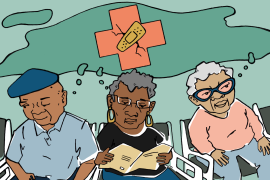Unmet Mental Health Care Needs
Black and Latinx adults often experience racism and a lack of respect in the health system, which can deter them from seeking mental health care. Racism itself has negative mental health impacts, including stress, anxiety, and depression, and racism in health care can lead to misdiagnoses as well as adverse physical health outcomes, including greater morbidity and mortality from chronic diseases. A recent Commonwealth Fund analysis found that older adults who reported feeling discriminated against when seeking health care are disproportionately people of color and are nearly twice as likely to report having a mental health diagnosis such as depression or anxiety than those who have not been discriminated against.
Further, in comparison to older adults in other high-income countries, Medicare beneficiaries report higher rates of emotional distress and mental health needs, with Hispanic Medicare beneficiaries reporting the highest rates.
But these needs are not met. Previous research has shown that a shortage of culturally competent providers and lack of coverage (Black people are more likely to be uninsured than white people) are reasons why Black and Latinx people may have untreated mental health issues. And compared with older adults in other high-income countries, older adults with mental health needs in the U.S. report the highest rates of cost-related difficulties getting health care. They also report the highest rates of economic hardships such as not being able to afford things like nutritious meals, rent or mortgage payments, or bills for monthly utilities, all of which can affect mental health and the ability to afford care.
Cultural Attitudes
In addition to discrimination and cost-related challenges, cultural taboos and stigma around mental health can result in people not getting the care they need. As one older Black adult said, “The inadequate resources for mental health as well as Black people’s inadequacy to deal with mental health [are both part of the problem].”
Another older Latinx adult said, “I know when my mother passed away my father couldn’t handle it, but he was . . . too macho to go to a therapist. I say, ‘We could find you a Spanish-speaking therapist.’ He said, ‘Oh, I don’t need that.’ I say, ‘Well, what about church?’ He was just very stubborn.”
Previous research shows that Black and Latinx Americans are more likely than their white counterparts to rely on religious institutions to help with mental health issues. One study found that 90.4 percent of African Americans indicate that prayer is very important when coping with stress, compared with 66.7 percent of non-Hispanic whites. There are multiple, complex reasons for this reliance on religious rather than health care institutions.
Many Black and Latinx patients say they don’t trust the health care system both for historical reasons and because of their own experiences. Lack of trust along with stigma can mean many people forgo care. As one older Latinx adult said, “Hispanic people associate treatment or therapy with being crazy . . . that’s what they associate it with, so therefore they don’t go.” Older Black adults echoed these sentiments. One said, “Family members do not want to deal . . . because Black people still have a stigma of mental health care.”
To be sure, stigma is also an issue among white Americans, but its impact is more acute among communities of color because it is layered upon worse access to care, higher rates of uninsurance, and greater mistrust in the health system.
Many people, particularly those in the younger generations, recognize that change is necessary. Jasso’s nieces and nephews have received treatment for mental health, and he believes it is this care that “keeps them . . . peaceful, calm, relaxed, and not harm[ing] themselves or . . . others.”
Policy Changes
There is an acute need for improved access to mental health care services in communities of color — a need that has been exacerbated by the COVID-19 pandemic, which has taken a greater toll on these communities. The White House in March announced a strategy to address the mental health crisis, including measures to strengthen provider capacity and expand access to services. Health policy leaders are also pursuing:




